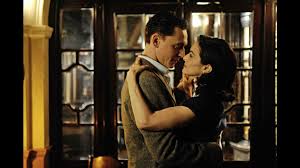Eye For Film >> Movies >> The Deep Blue Sea (2011) Film Review
The Deep Blue Sea
Reviewed by: Jennie Kermode

The early Fifties. Chintz wallpaper. Repressed emotions. The wife of a High Court judge walks out on him for love of a younger man. But this is no conventional celebration of romance, as the suicide attempt with which the film opens should indicate. Sometimes things don't go happily ever after. Hester's husband still loves her and she cannot escape the awareness of his pain. But more devastatingly than that, her young man, Freddie, has never really seemed to care. A forgotten birthday is just the latest indication of the ease with which she slips his mind. Now she knows he is slipping away and, in the face of her helplessness, she tries to find a rational reason to stay alive.
Terence Rattigan's powerful play has been adapted for the big screen before. The role of Hester could have been written for Vivien Leigh, yet Rachel Weisz makes it her own, delivering a powerful, raw performance that is undoubtedly Oscar material. She presents us with a woman who is sharply intelligent and acutely aware of her circumstances yet no more able to save herself because of that.

Much of the gay subtext of the play has been stripped away in this version (it's a shame to see so little of the doctor, though Karl Johnson plays him well) but in many ways this helps to bring out feminist themes that may seem more pertinent to 21st century viewers. Hester's emotional dependency on men is mirrored by her social and economic dependency, and though the subject is rarely touched upon, it's clear that she would be vulnerable on her own. She's caught at a point of social change where she is increasingly expected to take responsibility for herself yet is denied the tools to do it. The passion that she directs at Freddie seems like a surrogate for finding her own passionate connections with the world.
Unfortunately, what works wonderfully on the stage does not always translate well to the screen, and in other ways this film really suffers. The set decoration and the technical work are perfect (particular kudos should go to the sound crew) but the atmosphere is still too artificial, to a degree that feels inappropriate even in a story that sometimes takes artificiality as its subject. Too many scenes open in a contrived, awkward way that diminishes rather than enhances their impact. There are stretches of dialogue that feel leaden and some of the wittiest lines are let down by crude set-ups. Weisz works wonders with what she has and Tom Hiddleston makes a commendable effort as Freddie but struggles with the material; this ought to have been more effective than it is.
With its heroine caught between the Devil and the eponymous sea, this film finds itself caught between the art and romance crowds; it's not clear that it will fully satisfy either. There is no doubt that it has interesting things to say but its curiously old fashioned, awkward approach obfuscates them to little artistic effect. What remains is definitely worth watching if you like intelligent cinema. Still, one can't help but feel that it would have been better kept on the stage.
Reviewed on: 16 Nov 2011


















